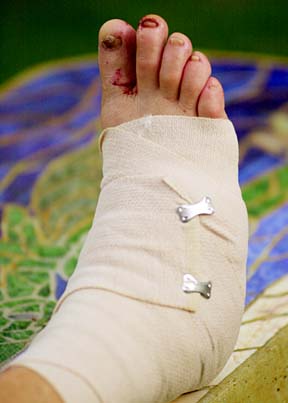
RICHARD WALKER / RWALKER@STARBULLETIN.COM
Shark bite victim John Marrack got a hug yesterday from family friend Amelia Bailey at his home in Manoa. Marrack was attacked Tuesday as he swam with dolphins off Makua Beach.
Shark attack believed
to be from great whiteAn expert stresses that such sharks
are rare in Hawaii waters
An expert believes a great white shark attacked a man off Makua Beach in Waianae on Tuesday morning.
Great whites are rarely seen in Hawaiian waters, said John Naughton, a marine biologist with the National Marine Fisheries Service and a member of the Hawaii State Shark Task Force.
John Marrack was bitten on the foot as he and 10 to 12 other people were swimming with dolphins.
Based on Marrack's account of the animal's size, color and behavior, Naughton said, "it's a really good possibility it was a great white."
"A marine biologist in California tagged a great white shark that has come to Hawaii for two consecutive years during the spring and summer," he said. "They are not common by any means, but this confirms that they are here."
Naughton could not say if Marrack was attacked by the tagged great white.
Marrack and the others were swimming with a pod of 40 to 50 spinner dolphins about 50 yards offshore when the dolphins suddenly "took off like bullets," he told the Star-Bulletin on Tuesday night.
Marrack immediately felt something grab his foot and let it go, and he saw a "huge silver body ... 5 feet wide" below.
RICHARD WALKER / RWALKER@STARBULLETIN.COM
Shark bite victim John Marrack kept his injured foot elevated yesterday.
Marrack made sure his wife, Stephanie, who was among the other swimmers, was safe and swam to a nearby tour boat for help, he said.
Naughton stressed that great whites are hardly seen in Hawaii -- he receives one or two reports a year and said they are "very rare compared to tiger sharks."
Both sharks are "apex predators," or at the top of the food chain, he said. Great whites prefer cooler waters and generally eat in the middle of the day. Tiger sharks like tropical waters and feed in the early evening, he said.
Another reason Naughton believes it was a great white is because for the past two years something has been preying on spinner dolphins, and biologists believe the predator was a great white, he said.
Naughton believes the shark let go of Marrack because "great whites like blubbery animals, like seals," while humans are too bony.
Victor Lozano, owner and operator of the Dolphin Excursion Tours boat that Marrack swam to after being bitten, saw Marrack underwater with the dolphins.
"He was part of the pod at that point," he said. "He was the slowest thing in the water, and within milliseconds he was bit."
Lozano said he is not expecting a drop in business, despite the attack.
Naughton advises using extreme caution when swimming with dolphins.
"If you see the animals acting unusually, like swimming away rapidly, by all means get out of the area," he said.
"Slowly leave the area and use slow, methodical strokes to swim away," he said. "Look like you know what you're doing."
Surrounded by relieved family and friends yesterday, Marrack was just happy to celebrate his 61st birthday.
"I feel very blessed, and it makes me remember life's a gift," he said while sitting in the garden.
"It doesn't matter what kind of shark it was. I'm just happy he released me," Marrack said.
"The orthopedic surgeon said John was lucky the injury was on the outside and not where permanent damage could have occurred," Stephanie Marrack said.
After four weeks of rest, Marrack hopes to return to Makua to swim with the dolphins again, he said.

